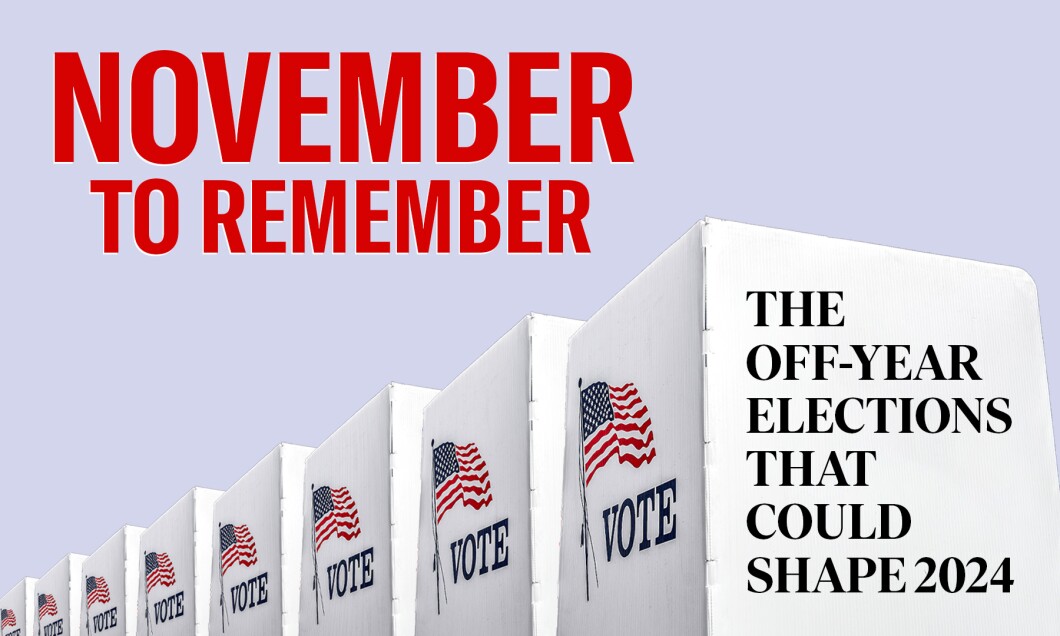
The 2023 elections may not have the fireworks of 2024, but there is still plenty up for grabs. In this “off-year,” most of which takes place on Nov. 7, Virginia will be keenly watched, particularly by followers of Gov. Glenn Youngkin and whether he can springboard Republican success into national aspirations. Meanwhile, the governor’s mansion is up for grabs in Kentucky and Mississippi. New Jersey’s Republicans believe they have a real shot at turning the state red in legislative elections, while there are also fierce mayoral and district attorney battles throughout the United States. Voters will also decide several fascinating referendums, particularly in Ohio, Maine, and Texas. This Washington Examiner series, November to Remember, will dive into all of these and more over the following two weeks. Part seven will deal with Maine’s ballot questions.
While there are no leadership positions up for election in Maine this November, voters will cast their ballot on several questions that are the product of in-fighting and the result of court cases ruling previous laws unconstitutional.
Nov. 7 marks a referendum election for the Pine Tree State, so none of the seats in the state legislature or the governor’s mansion will face reelection this fall. Eight ballot questions, four of which are constitutional amendments and four that are citizens’ initiatives, will have an effect on how elections are run in Maine and settle a debate over the fate of one of the state’s biggest utilities.
NOVEMBER TO REMEMBER: RANKED CHOICE VOTING TAKES CENTER STATE IN SALT LAKE CITY MAYORAL RACE
Several of the questions have faced lawsuits and court challenges at some point, while others were created in opposition to one another, making it likely that at least one of them will fail.

Ballot questions 1 and 3
Questions 1 and 3 are two ballot questions created in opposition to one another. No.1 seeks to cap the spending of No. 3’s utility consolidation plan. Question 3 is considered to be the most contentious referendum on the ballot this fall.
If approved, Question 1 would require voter approval in a general election for certain state utility entities, municipal electric districts, and other consumer-owned utilities to incur a debt that exceeds $1 billion. Under this initiative, certain entities would not be able to borrow money, incur debt, and issue bonds that would cause the company’s debt to exceed that amount.
Question 3 seeks to establish the Pine Tree Power Company, a consumer-owned utility, through a forced buyout of Central Maine Power and Versant Power, two investor-owned utilities that provide 97% of the state’s electricity.
No Blank Checks and Maine Affordable Energy are leading the campaign for Question 1. The two groups collectively reported $23 million in contributions and $21.6 million in expenditures, according to Maine campaign finance records.
“We did it because we got very frustrated with the proponents of Pine Tree Power trying to play the shell game with what it was going to cost to seize the utilities,” Willy Ritch, executive director of Maine Affordable Energy, said of Question 1 in an interview with local outlet WMTW. “They wouldn’t say, and they still don’t say, what it’s going to cost.”
Our Power, the organization behind Question 3, estimates the Versant-Central Maine takeover would cost $9.9 billion, while No Blank Checks puts the bill at $13.5 billion.
“Question 1 is another way that the utilities are trying to scare people from the possibilities and savings of Pine Tree Power,” Al Cleveland, campaign manager for Our Power, said to WMTW. “Those numbers that CMP and Versant are telling voters it’s going to cost aren’t based in any independent economic analysis, are not based on any nonpartisan information.”
Gov. Janet Mills (D-ME) is asking Maine residents to vote “no” on Question 3, stating that the creation of Pine Tree Power through a “hostile takeover” is a “gamble” on Maine’s future, saying that’s the “last thing we need.” She vetoed legislation two years ago that was similar to Question 3 for similar reasons.
“Can you imagine the interest payments on $13.5 billion? The cost alone leaves me very concerned that we’re proposing to mortgage the future of our children, who are going to have to foot this bill years down the road,” Mills said in a radio address in September.
Ballot Question 2
Question 2 follows a similar trend in states that are looking to prohibit foreign electioneering in campaigns. A “yes” vote would close a loophole in the state law and ban foreign governments, and entities of which they own at least 5%, from making campaign contributions or financing communications against candidates or ballot questions.
The question grew out of multiple attempts to scuttle a $1 billion electricity project in western Maine. In 2019, opponents to the project sought to place a ballot referendum halting the project. Hydro-Quebec, wholly owned by the Quebec government, spent money on advertising to convince Maine voters to support the project.
Current Maine election laws do not allow foreign nationals to contribute to candidate campaigns. However, the rules are vague on the issue of foreign electioneering in state referendums.
An interesting wrinkle about Question 2 is that, if this legislation had been in effect this year, it would have affected Question 3 fundraisers. Canadian corporation ENMAX, a supporter of Versant Power, has spent $2.5 million against Question 3, according to campaign finance records.
Polling from Maine Public Radio suggests that Question 2’s concept has strong public support, but it raises constitutionality questions about free speech and the “due diligence” of news outlets having to determine whether political ads run on their sites are paid for by foreign actors.
Some critics think that Question 2 violates the Supreme Court ruling in 2010 Citizens United v. FEC that the First Amendment prohibits the government from restricting independent expenditures for political campaigns from corporations. Supporters of Maine’s Question 2 said it seeks to blunt the substantial wave of spending that this 2010 ruling unleashed.
Ballot Question 4
Question 4 is the “right to repair” initiative, which is favored by small auto repair shops that will struggle to fix new cars, particularly electric vehicles, in the future.
The ballot measure would require vehicle manufacturers to standardize diagnostic systems and share the same information with repair shops as is shared with dealers. The goal is to give consumers the choice to fix their car outside of a dealership if that’s what they prefer.
Opponents to Question 4 say the groups in favor of the measure are after customer data to market directly to consumers. They also believe that small repair shops already have the information they need to make repairs.
Campaign finance reports show the Maine Automotive Right to Repair Committee has received nearly $4.4 million to push for passage of the ballot question. The opposition, which represents most of the manufacturers who produce Ford, General Motors, and Toyota vehicles, has only contributed $110,000.
Ballot Question 5
Question 5 asks whether voters favor giving election officials more time to validate petitions around major elections. Under the current constitution, election officials have 30 calendar days to verify signatures on petitions. If they do not verify the petition or they believe it was verified in error, petitioners can sue.
Question 5 would create a “blackout period” 30 days before and 30 days after a November general election on even years. If citizens bring a petition during that window, it would allow officials to accept the petition but set it aside for 30 days after the election. Once the window ends, the “clock starts up,” and officials would have 30 calendar days to verify the petition.
“It wouldn’t change when the petitions go on the ballot. It wouldn’t change the validity of the petitions in any way. It would simply let election officials concentrate on major elections for governor or for president,” state Secretary of State Shenna Bellows said in an interview with the Washington Examiner. “Keep in mind, those years we’re also electing our congressional races, and all of our state legislators races are up every two years. So, those are big elections.”
Bellows said the first two questions on the Nov. 7 ballot were presented to election staff the week prior to the governor’s race in 2022. The secretary of state said staff worked weekends and Veterans Day and canceled Thanksgiving vacation plans to verify signatures.
“Keep in mind signature requirements at this point are approaching 70,000. There are just over 60,000 to qualify — it’s 10% of the votes cast in the prior governor’s race,” Bellows said. “And so, you know, the staff was literally looking at almost 200,000 signatures combined on those two petitions.”
Question 6
Voters will decide on whether to amend the state constitution to require all provisions of the constitution to be included in the printed copies of the document.
In the 1800s, a constitutional convention ruled that printed copies of the constitution could not include the articles of separation from Massachusetts when Maine became a state, Bellows said. However, included in those articles were treaty obligations to the Wabanaki nations, so Speaker Rachel Talbot Ross advocated bringing the constitutional amendment forward, Bellows said.
Question 6 would have no legal effect, Bellows said, because “regardless of whether they are printed or not, they exist.”
“Our perspective on that is that we want Maine citizens to be able to review the constitution and understand all of their rights and responsibilities and all of the contents of the constitution,” the secretary of state said. “We don’t believe there should be secret provisions of the constitution.”
Question 7
Question 7’s inception dates back to an old law that prohibited out-of-state petition circulators from collecting signatures.
Democratic state Rep. David Boyer, one of the co-sponsors for Question 7, said no one had ever “cared enough” to bring a lawsuit to change the law. Many groups found a loophole, he said, by having a local Maine resident witness the signatures while out-of-state petitioners collected them.
However, campaigns began to notice they would need to pay Mainers more per signature than out-of-state circulators, so a group led by state Rep. Billy Bob Faulkingham challenged the law.
A district judge in We The People PAC v. Bellows in 2022, as well as a court of appeals, sided in Faulkingham’s favor, ruling that out-of-state circulators have the right to come into Maine and petition people under the First Amendment, so the state law was unconstitutional.
“I think the idea with the court is, just because somebody from away circulated it doesn’t, you know, shouldn’t take away the voice and the speech of the voters that are signing and putting their name to this ballot initiative, and that’s not a compelling reason to stifle that that act of democracy,” Boyer said.
Bellows said she disagreed “strongly” with the ruling.
“I really think that petitions that are going to change the law should be circulated and signed by Maine voters and Maine citizens. But that wasn’t the ruling of the court,” Bellows said.
The secretary of state said despite her personal feelings, she believes the constitution “as our source document should be accurate.” Similar to Questions 6 and 8, Question 7 will also have no legal effect, Bellows said.
Boyer called it a “housekeeping amendment,” anticipating that Question 7 would likely pass but could come down to a few votes.
“Us Mainers are stubborn, and you know, ‘Why do we want people from away being able to collect signatures?’ It’s a fair question, to some degree,” Boyer said. “So, I think it will pass, but I could see it being a little closer than expected just because, you know, we’re definitely skeptical of folks from away.”
Question 8
Question 8 also stems from a court case in 2020 in which three Maine women who were under guardianship for mental illness could not vote in that year’s presidential election under state law.
Following appeals, the courts agreed that denying a Mainer in this scenario the right to vote violated the equal protection and due process clauses of the 14th Amendment, as well as the Americans with Disabilities Act.
CLICK HERE TO READ MORE FROM THE WASHINGTON EXAMINER
Bellows said she found the language discriminatory and agreed with the courts’ ruling.
“Since 2000, every Maine citizen has had the right to vote. One of my concerns about the existence of this discriminatory, antiquated language is, again, Mainers should be able to read the Constitution and understand what their rights are,” Bellows said. “If you’re reading the Constitution, you might think that you couldn’t vote if you were under guardianship for reason of mental illness, or a guardian might think that the person in their care did not have the right to vote, and that is simply not accurate.”






